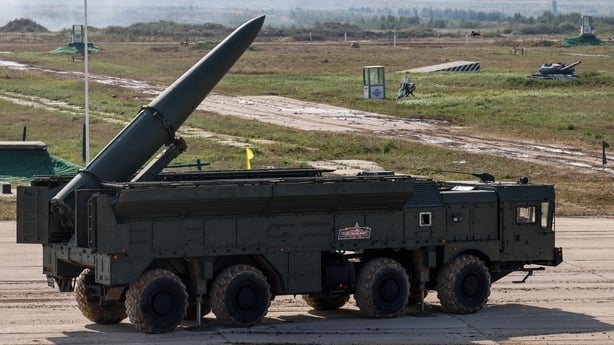Russian investigators have charged Darya Trepova, a 26-year-old St Petersburg resident, with terrorist offences over the killing of pro-war blogger Vladlen Tatarsky in a bomb blast last weekend, and remanded her in pre-trial detention.
Mr Tatarsky, a cheerleader for Russia's military campaign in Ukraine whose real name was Maxim Fomin, died on Sunday in a St Petersburg cafe where he was due to talk.
The Investigative Committee, which investigates major crimes, said it had charged Ms Trepova with committing "a terrorist act by an organised group that caused intentional death".
The charges carry a maximum jail term of 20 years.
It said she had acted under instructions from people working on behalf of Ukraine.
Russia's health ministry said 42 others had been injured in the blast, and 24 were still in hospital.
Ms Trepova was transferred from St Petersburg to Moscow, where the Basmanny district court remanded her in custody until 2 June, Russian news agencies reported.
Footage of the St Petersburg event had Mr Tatarsky showing a figurine off to his audience before it exploded.
Russia's National Anti-Terrorism Committee accused Ukrainian intelligence of organising the killing with help from supporters of jailed Kremlin critic Alexei Navalny - a possible reference to the fact that Ms Trepova once registered for an anti-Kremlin tactical voting scheme promoted by Mr Navalny's movement.
An aide to the Ukrainian president said the attack was the result of internal conflict in Russia.
Ilya Ponomaryov, a former Russian lawmaker turned Ukraine-based Kremlin critic, published a statement from what he said was a group of Russian militants called the National Republican Army in which it claimed responsiblity for the blast.
Last August, Mr Ponomaryov said the National Republican Army had planted a car bomb that killed Darya Dugina, the daughter of an ultra-nationalist, near Moscow. Until that point the group had never been referred to publicly.
Court documents indicated that Ms Trepova had been detained at a protest on 24 February last year, the day Russia sent its armed forces into Ukraine.
Her husband told the independent investigative outlet The Insider he believed she had been framed and had not known the statuette contained explosives.
Mr Tatarsky had himself fought in Ukraine for separatist forces, and also served time in Ukraine for bank robbery.
Last year, in a video shot at a ceremony in the Kremlin to mark Russia's unilateral annexation of four Ukrainian regions, he said Russia should "kill everyone" and "rob everyone" in Ukraine.
Belarus troops begin training on nuclear-capable missile system
Belarusian troops have begun training on a nuclear-capable Russian missile system following President Vladimir Putin's decision to deploy tactical weapons on Belarusian territory, Moscow and Minsk have said.
Mr Putin on 25 March said he would station tactical nuclear arms on Russia's ally, a move that drew widespread criticism.
Tactical nuclear arms are battlefield weapons that, while devastating, have a smaller yield compared to long-range strategic weapons.
"An Iskander-M operational-tactical missile system has been transferred to Belarusian forces," Defence Minister Sergei Shoigu said.
"On 3 April, Belarusian crews began training on how to use it," he said.
Belarus' defence ministry published photos of men in uniforms with the Belarusian crest, their faces hidden, getting on military planes to Russia.
"The crew of these units will study in detail issues relating to the maintenance and use of the tactical nuclear weapons of the Iskander-M missile system," the Belarusian defence ministry said on Telegram.
"They will undergo a full training cycle at one of the Russian armed forces' training grounds," it said, without saying how long the training would last.

Mr Putin's announcement spurred fears of nuclear conflict, but experts and governments said it was unlikely that the move would change the course of the conflict.
Russia is building a special storage facility for such weapons, which it plans to finish on 1 July.
Belarus's authoritarian leader Alexander Lukashenko said last week he was ready to host "strategic" Russian nuclear weapons "if need be".

